Fire Safety Tips for Consumers
Follow these fire-safety practices to help protect your home and loved ones
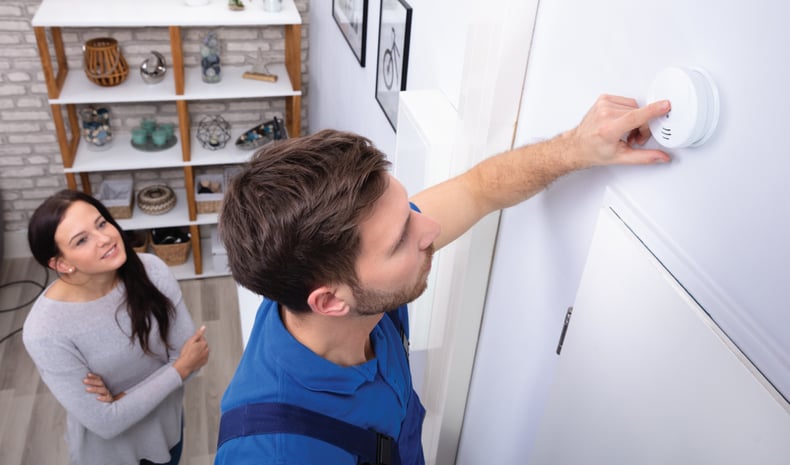
For more than a century, WSRB has operated in the public interest, helping Washington state insurance consumers feel confident their fire premiums are set using fair, unbiased data. Part of our promise is to provide information that helps insurance companies reduce loss of life and property, and we produced this guide to help fulfill that promise. The following tips are for anyone who wants to stay safe and avoid the painfully expensive peril that is fire. Insurance agents can share this guide with customers; fire service professionals can share it will local citizens, and consumers can read it and implement the tips to make their homes and loved ones safer.
How to use these tips
In this guide, we go in-depth on home fire safety and home wildfire protection practices. Throughout, you'll find links to blog posts with even more useful information, so be sure to click through if you see a topic of interest. Find fire-safety tips for business owners here.
If you're an insurance professional looking for more information, see our guide to commercial property risk, which includes detailed information on automatic sprinkler systems and other key topics, and our guide to underwriting property, which covers fire, wildfire, and earthquake risk to residential and commercial properties.
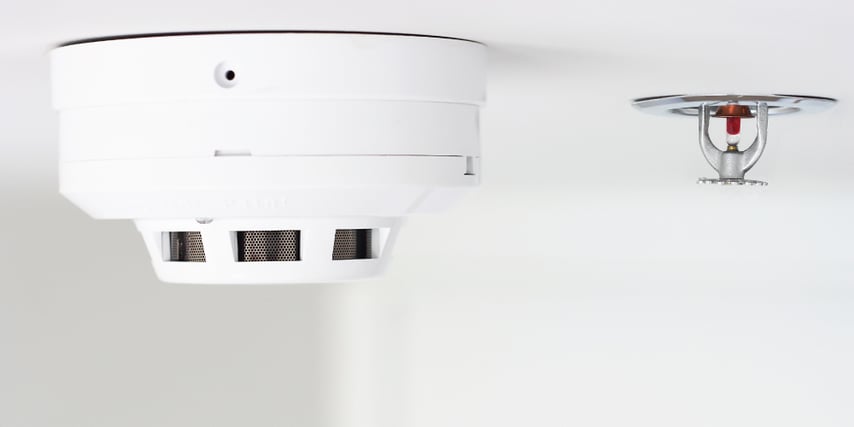
Fire safety fundamentals
Smoke alarms: have enough and install them in the right places
Everyone should have at least one smoke alarm in their home, and you most likely need more than one. Ideally, there should be a smoke alarm in every bedroom, outside every sleeping area, and on every level of a home, including the basement. The National Fire Protection Association provides specific guidelines for where to place alarms in each of these locations.
Once you're sure your smoke alarms are in the right place, take a moment to test them and check their age. Continue to test them twice a year and replace the battery at least once a year, even if the primary power source is the home's electrical wiring. Replace the entire unit, not just the battery, every 10 years.
Smoke alarms: consider buying new ones soon
Smoke alarms can save your life, but they can also become a nuisance if they sound every time you accidentally burn toast or overcook a burger. These instances frequently lead people to turn off their smoke alarms, putting them at risk.
The good news is that smoke alarms are getting smarter. Be on the lookout for a label with the text “Helps Reduce Cooking Nuisance Alarms.” The alarm should be certified by Underwriters Laboratory (UL), the organization that sets safety standards for a wide variety of home and industrial devices, including smoke alarms.
Clear the way for firefighters
If a fire starts in your home, it's essential that firefighters can enter the burning building as quickly as possible. Any hindrance that slows them down gives the fire more time to grow and spread. Here are specific steps you can take today, and on an ongoing basis, to ensure firefighters will be able to enter your property:
- Create and keep clear a path to your home from all sides. Otherwise, firefighters may need to try different access pathways, which takes valuable time.
- Keep the space around your home free of debris. If there's not much space between your home and your neighbor's, consider storing nothing alongside your home.
- Declutter your home's interior so firefighters can get to the fire fast.
- Check with your local fire marshal before installing solar panels. Firefighters sometimes need to cut through the roof of a burning home, and solar panels could slow them down, depending on how the panels are arranged.
Keep hydrants accessible
Most of the time, fire hydrants are easy to overlook — except, of course, when you're searching for a parking spot. When a fire strikes, though, they become essential to saving property and lives. If firefighters can't access a hydrant, they have to clear a path or find another hydrant, taking valuable time away from fighting the fire burning in your home.
Here's what you can do to help firefighters access hydrants quickly and easily:
- Don't park in front of a hydrant. If you do, you risk getting a ticket or towed. If you park in front of a hydrant and a fire starts nearby, firefighters will be delayed in accessing the water they need to extinguish the fire.
- Keep the area around hydrants on your property clear of vegetation, bird baths, and, in the winter, snow.
- Don't alter the appearance of a fire hydrant in any way. Hydrants are painted so they're easily visible. In some cases, the color of a fire hydrant gives firefighters useful information about its water capacity, so they need to be able to clearly see the hydrant.
- If you see a problem with a hydrant — perhaps it's leaking, for example — call your local water department to report the issue.
Fire extinguishers: inspect and maintain them on schedule
Fire extinguishers designed for home use are an affordable safety tool to have on hand, and some models can safely and effectively fight multiple kinds of fires, including electrical fires. To ensure your extinguisher is ready for you when you need it, you'll need to do monthly and annual maintenance.
Every month:
- Check the entire extinguisher, including the hose, nozzle, pin, and tamper for signs of damage, aging, or obstructions.
- If the extinguisher has a gauge, be sure the reading is charged (or in the green zone, depending on your model).
- Turn the extinguisher upside down and then right side up. If any extinguishing agent has compacted, this process will loosen it.
- Put the extinguisher in a place that's unobstructed and everyone in your home knows about it.
Every year:
- Have a professional inspect the extinguisher and check if it needs hydrostatic testing.
- Be sure the inspector leaves a tag on the extinguisher indicating the inspection date.
If you ever need to use a fire extinguisher, remember PASS:
- Pull the pin with the nozzle facing away from you.
- Aim at the base of the fire.
- Squeeze the lever gently.
- Sweep from side to side.
For more info, read our blog How to Properly Use a Fire Extinguisher.
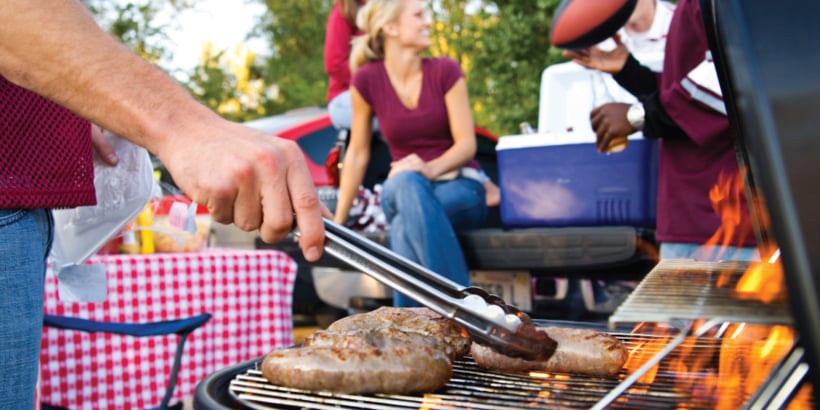
Holidays and parties
Getting together with your friends, family and loved ones should be fun and free of concern about accidents, injuries, or fires.
Grill safely
Barbecuing is a tasty way to celebrate throughout the summer, so be sure to follow these safety tips:
- Grill only in a well-ventilated, outside area.
- Follow all the instructions and safety warnings your grill came with.
- Clean your grill to prevent flare-ups.
- Maintain a safe distance between your grill and any combustible items, including furniture, railings, overhangs, and branches.
- Keep a fire extinguisher nearby.
- Do not allow kids or pets within three feet of the barbecue to keep them safe and prevent anyone from tipping over the barbecue and causing a fire.
- Follow any rules your apartment or condo building enforces.
REMEMBER: Never barbeque on an apartment or condo balcony.
Learn more about why balcony fires are particularly dangerous and how our team can help you address potentially troublesome policies in your book of business.
Party on the rooftop deck — responsibly
As rooftop decks on apartment and condo buildings have become more widespread, so have rooftop deck fires. They often happen during the summer and fall, when the plants on the deck have dried out, creating fuel. Rooftop deck fires can burn slowly at first, especially if they start due to an improperly extinguished cigarette. These fires can burn for hours undetected.
If you live in a building with a rooftop deck or just plan to attend a party at one, here's what you can do to prevent fires:
- Smoke in designated areas only and obey any smoking bans.
- Properly extinguish and dispose of anything you do smoke.
- Inform building management of any accumulated trash or dry foliage.
- Grill safely.
Enjoy fireworks without worry
The easiest way to enjoy fireworks risk-free is to attend a public show or watch one on TV. If you decide to set off fireworks at home, be sure to:
- Follow all applicable rules in your area. In many parts of Washington state, fireworks are illegal.
- Set off fireworks a safe distance away from combustible items or materials, and do not set off fireworks in dry fields.
- Do not allow children to set off fireworks.
- Keep an extinguishing method (hose, water source, fire extinguisher) nearby.
- Do not re-light a firework that doesn’t ignite properly.
- Completely extinguish fireworks that have finished burning, and then dispose of them.
Recreational vehicle (RV) safety
The summer is a popular time to hit the open road in RVs and campers; following proper fire safety can mean the difference between an enjoyable holiday in the countryside and a total disaster.
RVs face an elevated fire hazard due to their limited space, presence of propane appliances, and complex electrical systems. It is essential to be well-versed in handling fire emergencies and adopt proactive measures, such as:
- Regular Maintenance: Conduct regular checks of electrical, propane, and heating systems for frayed wires, damaged outlets, and overloaded circuits. Inspect and repair any leaks or damaged components in the propane system.
- Proper Storage: Store flammable liquids (gasoline, propane) in sealed containers, away from heat sources, and in a well-ventilated area.
- Cooking Safety: Practice safe cooking by never leaving appliances unattended, keeping flammable materials away from the stove, and ensuring all cooking appliances are turned off before leaving the RV.
- Smoke Alarms and Fire Extinguishers: Install smoke alarms in sleeping areas and keep fire extinguishers easily accessible near the door. Learn how to use a fire extinguisher effectively.
Learn more about RV safety in this helpful guide - Ultimate Guide to RV Fire Safety
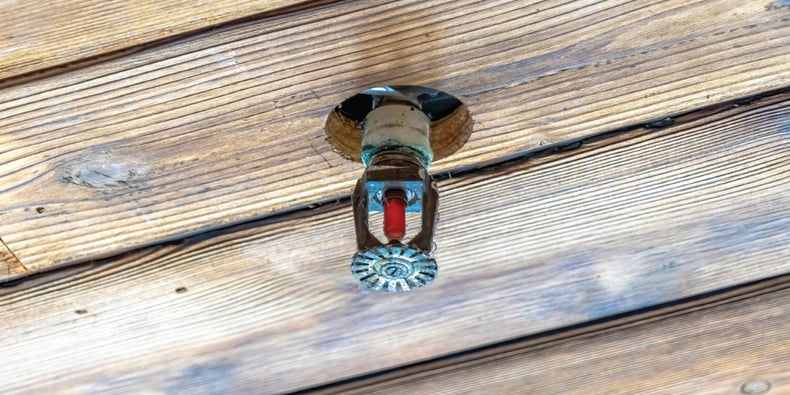
Upgrade your home fire safety
When you're looking for a new home or planning a remodel, consider adding home fire sprinklers to your list of must-haves. These systems can save lives and property more effectively than smoke alarms alone. Check out these articles on fire sprinkler myths and common home fire sprinkler questions to gain a greater understanding of how they work.
A home fire can reach what fire safety professionals call the flashover point — the point where everything in a room catches fire and no one can survive — in as few as five minutes. Watch a powerful demonstration video of flashover in a home fire:
The video concludes with a side-by-side comparison of two burning rooms, one with a sprinkler and one without. showing the potential value of home fire sprinklers. Yet, the systems aren't yet common. People sometimes worry home fire sprinklers will be set off by burned food, cause water damage or be very costly. How many of these are true? Here are some possibly surprising facts about home fire sprinkler systems.
Fire sprinklers are set off by heat, not smoke
Sprinklers contain heat-sensitive material; when the material reaches a certain temperature, a built-in mechanism opens the sprinkler. Burning fries or over-searing chicken won't activate a sprinkler and douse your kitchen — or you.
Fire sprinklers probably won't cause major water damage to your home
Fire sprinklers activate individually, not as a group, meaning the water is isolated to the area with the fire. As a result, there's little risk that any water damage will be widespread.
Fire sprinklers start fighting the fire soon after it starts, far sooner than firefighters will arrive. That keeps the fire small and reduces the amount of water necessary to extinguish the fire when firefighters show up to finish the task.
Fire sprinkler systems cost about $1.35 per square foot
That's an estimate from the Home Fire Sprinkler Coalition, based on installation in new construction. Your costs will vary, but you may also get a discount on your homeowners insurance if you have the sprinklers installed. You can also add a sprinkler system to any existing home, though some homes are easier and less costly to retrofit than other homes.
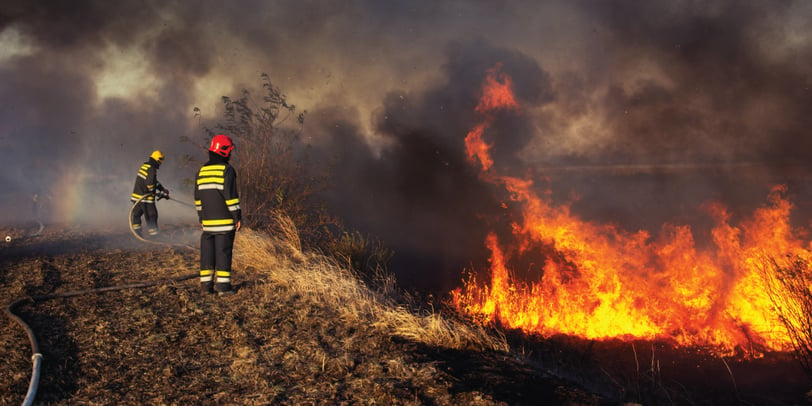
Wildfires: prevention and protection
Wildfires are becoming more common and more severe, but there is good news. You play a larger role in preventing wildfires than you may realize. Did you know approximately 70% of wildfires are caused by humans? What might seem like a harmless activity, such as burning a pile of leaves in your backyard, can create embers (also called firebrands) that travel on the wind and ignite bushes, trees, or other homes. Do your part to prevent wildfires by following tips from the Washington State Department of Natural Resources.
Protecting your home from wildfire damage
Homes throughout Washington state are at risk of burning in a wildfire, including those in Western Washington, despite the region's reputation for rainy weather. At particular risk are homes in the wildland-urban interface (WUI). The WUI is growing, meaning more homes are at risk now than in the past. In fact, one of our WSRB teammates lives in the WUI, and she shares her experience of escaping a recent wildfire.
If you live in the WUI or another wildfire-prone area, it's essential to create defensible space around your home by:
- Ensuring your roof is in good condition and made of fire-resistant material.
- Clearing away combustible material, such as leaves or needles, from the roof and gutters.
- Installing screens on any openings, including those in the chimney, roof, attic or elsewhere, to prevent embers from entering and starting a fire.
- Keeping as little combustible material near your home as possible. For example, store firewood away from your home, not next to it.
- Using fire-resistant plants in your landscaping and keeping your grass and plants well-watered.
The National Fire Protection Association (NFPA) provides several additional resources to help you protect your home. Visit the NFPA's Firewise USA website to learn more. And consider participating in the NFPA's annual Wildfire Community Preparedness Day to work with your neighbors to protect your home and theirs from wildfire damage.
If you have questions about insurance coverage for natural disasters (including wildfire), explore the NW Insurance Council's guide.
Looking for more tips?
We hope this guide and the linked articles gave you the tips you need to be fire safe. If you are looking for more information, your local fire marshal is a useful resource. Call your nearest fire station to get the fire marshal's contact information. If you're not sure which fire station is closest to you, contact our Customer Service team at 206-217-0101, Monday through Friday between 7:30 a.m. and 4 p.m. We can help.








